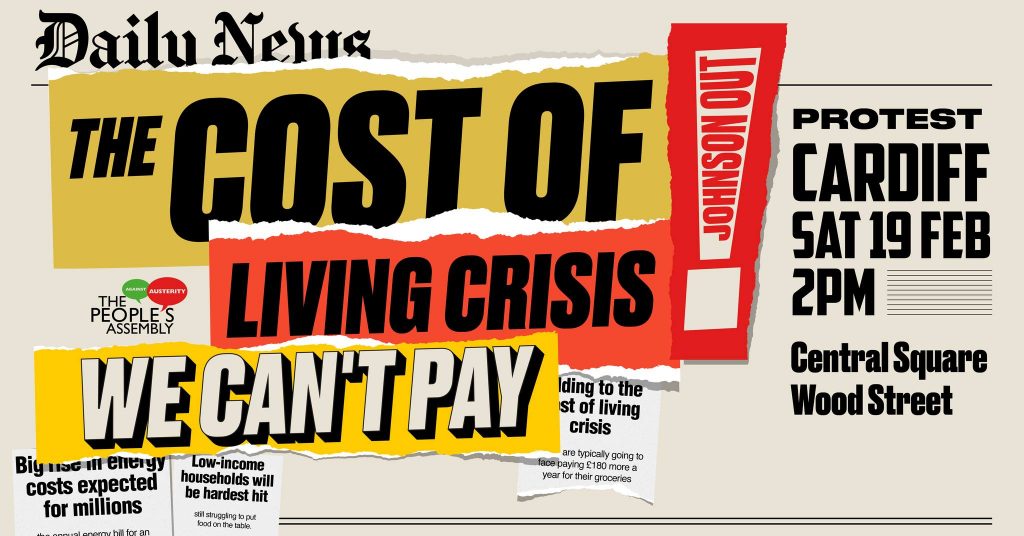Residents and politicians urge more action to reduce the effects of rising bills
CAMPAIGNERS are to make a stand across Cardiff throughout the week as citizens have become increasingly worried about the cost-of-living crisis.
This year, low-income households across Wales will “bear the brunt” of more expensive energy costs, shop prices and taxes as the UK experiences an increase in inflation.
Steps to combat this are being taken by the Welsh Government through provisions including £150 of council tax credit and the Winter Fuel Support Scheme which, it was announced today, will have its contribution doubled.
But some people think current measures do not go far enough.
Adam Johannes, 42, from Adamsdown, is secretary of Cardiff People’s Assembly which is holding a protest on Saturday to demand more Government action.
Our government is acting like energy is the weather and something they cannot control.”
Adam Johannes

Photo by: People’s Assembly Wales
Mr Johannes’ passion for this campaign stems from a similar cost-of-living crisis he faced during his childhood.
He said: “I grew up in the 1980s under the Tory Government – Thatcher and John Major. I remember when I was quite young, my father was unfairly sacked from his job, and we were plunged into poverty.
“I remember once a week I used to see my mother writing the shopping list. I’d notice the tenseness and stress at that moment. Adding up to every last penny, crossing out things we couldn’t afford.
“I remember one time she was crossing out things but no matter how she adjusted the pennies somehow we were going without. I saw her burst into tears, and it really made me think. Why should people live in these conditions in one of the wealthiest countries in the world? Why do people have to struggle like that?”
Mr Johannes and Cardiff People’s Assembly will be voicing numerous demands to the Government as part of the weekend protest. This includes capping the rise in energy costs and lifting the minimum wage to £15 per hour to better help low-income households.
He said: “The cost-of-living crisis spreads over many communities and many issues. I think people have got used to a lower standard of living than they should be.
“Our government is acting like energy is the weather and something they cannot control, but when you look at other countries you can see this is not the case. In France they told the energy companies ‘you take the hit’ and gave them a cap.”
The energy regulator Ofgem announced that the energy price cap will increase by 54% for approximately 22 million customers from April 1.
Nigel Goring, 65, from Barry is another Cardiff resident concerned about this energy price increase. He has been solely dependent on Government benefits after suffering a disabling spinal disease in 2019 and is worried what this will mean for his future.
Mr Goring currently spends £2.50 per day on electricity and gas bills. A 54% increase will force a change in his lifestyle to comfortably afford £3.85 each day.
“Rising energy prices and shop prices will hurt me, but it won’t be too dangerous. I’ll have the luxuries I can afford but the rest will just have to go. The government should stop gas companies from raising their prices so much. The companies can afford the cost,” he said.
Before the weekend protest, MS for South Wales Central, Heledd Fychan, will also be hosting a summit to discuss practical ways of tackling the cost-of-living crisis.

Photo by Heledd Fychan MS
She said: “I’m taking part in the protest on Saturday and have organised a cost-of-living summit to take place on Thursday because this is something which hugely concerns me and impacts thousands of people I represent.”
This summit follows a Senedd debate which took place last Tuesday drawing attention to rising costs and a need for this to be incorporated in the Government’s 2022 Budget.
Chair of the Senedd’s finance committee, MS Peredur Owen Griffiths, who participated in this debate, also asked for more to be done about the crisis.
“The committee notes the Welsh Government’s ongoing efforts to address the crisis, such as the discretionary assistance fund, help with winter fuel bills and the extension of free school meals, although we heard that a range of schemes have a low profile, meaning the most vulnerable people are missing out,” he said.
“Welsh benefits should be simplified and consolidated. We call for the establishment of a single entry point that links across the key services and schemes so people can easily access the support they are entitled to.”
The committee is waiting to hear whether the Welsh Government has accepted these recommendations.
On March 8, a Final Budget will be decided upon by the Welsh Government and the Senedd. This will determine the response to Wales’ cost-of-living crisis in the year ahead.



